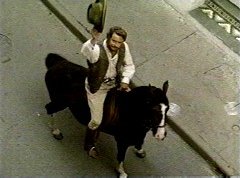 Karen: Karen:
(Nan) Remember ladies, Nostromo is on tonight.
Bring on the pygmy horses!
Heide:
Questions for those who'd care to try:
-
When did Charles become obsessed with the mine? Was it always in him, going
back to the death of his father? When he came back to the mine? Later?
Earlier?
-
Does Charles truly love Emilia?
-
Does Colin ever wear an uglier suit than in the train scene?
Bethan:
I read an interesting comment by a man, who said that Charles Gould
was an "il pappano" (a daddy's boy) who wanted to prove that he was better
than his father. He also commented that Emilia had all the guts, Charles
was a weakling, and it was an interesting part for an actor to play (i.e.,
a weakling).
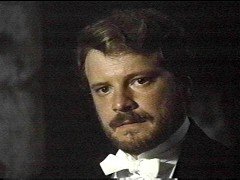 I
think this observation casts light on CF's performance. I tend to see Gould
as a reserved, obsessed man who is basically strong. But many of his actions
are those of a weak and dangerously indecisive man, who in the end is just
as much a failure as his father. This makes Emilia a doubly tragic figure.
By staying loyal to her husband she is condemned to spend her life in a
world she grows to hate. In the end she must also realise that he has compromised
his ideals, and yet she can't stop loving him. I
think this observation casts light on CF's performance. I tend to see Gould
as a reserved, obsessed man who is basically strong. But many of his actions
are those of a weak and dangerously indecisive man, who in the end is just
as much a failure as his father. This makes Emilia a doubly tragic figure.
By staying loyal to her husband she is condemned to spend her life in a
world she grows to hate. In the end she must also realise that he has compromised
his ideals, and yet she can't stop loving him.
I remember Renate quoted a reviewer who said that it was unusual for
someone who looked like CF to play inadequate, unheroic characters.
 (Heide)
Does Charles truly love Emilia? (Heide)
Does Charles truly love Emilia?
He certainly loves her in the sense that he would never look at another
woman and would be destroyed if she left him, which is probably why she
stays. The book—not the film—makes it very clear that the responsibilities
for the mine and Sulaco ultimately destroy his health, and Emilia knows
that she will be left alone.
"With a prophetic vision, she saw herself surviving alone the degradation
of her young ideal of life, of love, of work—all alone in the Treasure
House of the World....He did not see it, he could not see it. It was not
his fault. He was perfect, perfect; but she would never have him to herself.
Never, not for one short hour together...."
Arami:
(Bethan) by staying loyal to her husband she is condemned to spend
her life in a world she grows to hate. In the end she must also realise
that he has compromised his ideals, and yet she can't stop loving him.
This seems a summary of many a real life marriage.
Heide:
Bethan, I compliment you on finishing the book. I only read bits of
it in a comparative study of Conrad's other works and found it deadly dull.
You probably have insights into the characters that I don't, only having
the film to decipher. It's distressing to learn that they never leave the
place and that it ruins his health. I suppose they never have children
either, do they?
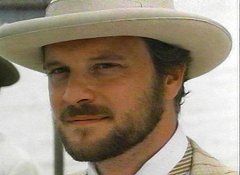 In
what ways do others find Charles weak? My impressions of Charles are not
of a weak or indecisive man at all. To me, he seems very capable, strong,
brave, determined, paternal. He knows just what to do to get the mine open,
who to bribe, who to trust, who to curry favor with. He practically arms
the militia himself and puts himself in grave danger. I do find the idea
of a "papa's boy" interesting though and think that is on target. In
what ways do others find Charles weak? My impressions of Charles are not
of a weak or indecisive man at all. To me, he seems very capable, strong,
brave, determined, paternal. He knows just what to do to get the mine open,
who to bribe, who to trust, who to curry favor with. He practically arms
the militia himself and puts himself in grave danger. I do find the idea
of a "papa's boy" interesting though and think that is on target.
He's in love with the country; you can see it in his face when they
come into the harbor. He loves his wife but takes her for granted. She
is a very strong, self-reliant lady herself. I really like her. She desperately
loves him and remains true to him though she later sees what real passion
is. She welcomes this strange new life, doesn't wilt in the heat, makes
friends easily, is kind to Dr. Monygham, is astute and loyal and, most
importantly, isn't afraid of snakes and bugs. She's a perfect partner for
her husband but he doesn't let her be one.
Left shoulder alert in the mine scene!
Renate:
I did not like Nostromo the first time and was reluctant to try it
again. But I did, and it's the same all over again, even less than 30 minutes
into the film.
You have a lot of meaningful camera shots and good suspenseful music,
but there's nothing really happening to meet that promise. Every action
seems to peter out for just another person or unconnected thread of the
story to be introduced. I think the script has a mechanical structure,
weak dialogue and too many major characters. The casting was poor in some
areas. The only persons you can remotely relate to are Albert Finney and
Emilia Scott-Thomas. Charles Gould is a locked-up, self-centered character
who is played as very focused, quiet and introverted. Not a character to
identify with anyway. (Watch the very controlled movements.)
Too many people milling around, and you know all of them are going to
be awfully unhappy at the end. Depressing.
Heide:
A very complicated plot which requires several viewings to comprehend
and even then it's not always clear. I tend to agree with your view, Renate.
The main problem, in my mind, are the number of characters. There are too
many villains, too many minor characters (Don Jose, Don Pepe and Don Ambrosio
all got mixed up in my mind even though they're all very different) and
too many colonels and generals.
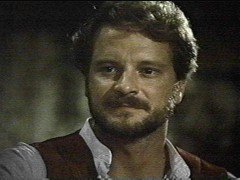 There
are things to like. All the characters are flawed (except Emilia) which
makes for interesting motive questions. There are a few golden Colin moments
as well. I use the word "golden" intentionally because I love picking out
the shots where his hair is almost blonde. I also like his rugged appearance
toward the middle of the series, while he struggles to save his silver
when all the hostile sides are converging on Sulaco. There
are things to like. All the characters are flawed (except Emilia) which
makes for interesting motive questions. There are a few golden Colin moments
as well. I use the word "golden" intentionally because I love picking out
the shots where his hair is almost blonde. I also like his rugged appearance
toward the middle of the series, while he struggles to save his silver
when all the hostile sides are converging on Sulaco.
A difficult film to like.
Question: Is Charles merely mercenary? Trying to make a fortune from
the silver, thus his rush to get it out of the country? Or is he more of
a benevolent despot, treating his workers well but all in his quest of
trying to emulate his father and finishing (or besting) what his father
begun?
Renate:
(Heide) There are a few golden Colin moments as well...where his
hair is almost blonde.
I like your observation, Heide. Golden Boy in the Silver mine. No complaints
about his looks. The love scenes are, by far, too brief. I giggled when
I realised that he's in a wet white shirt again.
Karen:
I was intrigued with the comment that Charles' obsession had to do
with outdoing his father. Unfortunately, or as usual, I don't agree but
there may be a *father* tie-in. That would be to Conrad's own experiences
of being abandoned by his father and his political activities. Nostromo
is one of Conrad's political novels, which he is illustrating the corruption
and destructive effects of politics.
1. When did Charles become obsessed with the mine?
What brings him back? It was Don Jose (Antonia's father) who talked
him into coming back and reopening the mine. Don Jose and Charles are idealists.
They think that, through economic prosperity, they can lift Costaguana
out of its corrupt past and install a government committed to helping the
poor natives. Unfortunately, Charles' obsession with the silver takes over
and nothing good can come of it. He will have to sacrifice everything (love,
friendship and self) to the economic and political entity he has created.
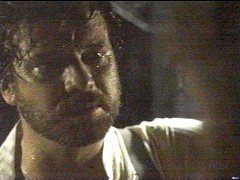 Charles
also comes back to avenge his father's death and he thinks he is the man
to do it—a Hercules who will clean the Augean stables. He has an irrational
need to revive the mine and perform a ritualistic act of slaying the dragon
that slew his father. Like the fairy tale he mentions when he and Emilia
are in the mine: "It's like fairy tales when you're young. The spell is
cast over you." Charles
also comes back to avenge his father's death and he thinks he is the man
to do it—a Hercules who will clean the Augean stables. He has an irrational
need to revive the mine and perform a ritualistic act of slaying the dragon
that slew his father. Like the fairy tale he mentions when he and Emilia
are in the mine: "It's like fairy tales when you're young. The spell is
cast over you."
(Bethan) a reserved obsessed man who is basically strong. But many
of his actions are those of a weak and dangerously indecisive man
I agree that Gould is basically strong. He's an adventurer, hardly
what I would classify as a weakling. But like many characters or real persons,
they have flaws. Charles has flaws because Conrad believed in human values
over political idealism.
(Bethan) This makes Emilia a doubly tragic figure...she is condemned
to spend her life in a world she grows to hate.
Yes and she will never have the children she desires because he has
given it all to the mine. The silver has become their children. She is
alone, just as all the characters get stripped of their outer façades
and face what they have become.
(Renate) The casting was poor in some areas.
Your critique of the production elements rings quite true. It really
takes away from a production when the supporting players are not up to
par. At times, it even seemed like some of the dialogue had been dubbed
because the people didn't sound right. Giorgio Viola is an example.
(Renate) Charles Gould is a locked-up, self-centered character who
is played as very focused, quiet and introverted.
Couldn't he be considered a caricature for British imperialism?
(Renate) depressing
Yes, but isn't Conrad trying to make that point? The futility of a
life devoted to political change. All the main characters are flawed. Teresa
Viola, who cherishes her family, is probably the only sympathetic character.
Personal values, including love and family, were what Conrad believed in,
and he had her die within the politically corrupt environment of Costaguana.
(Heide) There are a few golden Colin moments as well.
Strange you should refer to gold because throughout my watching the
song "Goldfinger" kept going through my mind. They are so similar. Think
about the lyrics. Wouldn't it be strange if Ian Fleming were influenced
by this novel and he took the character Gould to its radically evil limits.
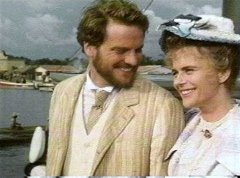 Arami: Arami:
(Karen) she will never have the children she desires
Isn't it assuming too much? I mean, the mine is his life and all that,
but even men with strange overpowering obsessions sometimes do sleep with
their wives. So how can we be sure? Or was it categorically stated in the
film and I missed it?
Bethan:
(Karen) she will never have the children she desires
It's stated categorically in the book. I actually can't claim to have
read it cover to cover. CF called it "structurally incoherent" and said
that the best part was the imagery, which is a pretty fair piece of lit
crit! I just dipped in and skim-read, and there are some good passages.
The book also jumps 10 years so we see Charles and Emilia when they are
older. The end of Chapter 11 clearly indicates that Charles destroys his
health and dies young, they have no children, and Emilia survives alone.
Incorrigible in his hard, determined service of the material
interests to which he had pinned his faith in the triumph of order and
justice. Poor boy! She had a clear vision of the gray hairs on his temples.
He was perfect—perfect. What more could she have expected?...and love was
only a short moment of forgetfulness, a short intoxication, whose delight
one remembered with a sense of sadness, as if it had been a deep grief
lived through....A terrible success for the last of the Goulds. The last!
She had hoped for a long, long time that perhaps— But no! There were to
be no more....With prophetic vision she saw herself surviving alone the
degradation of her young ideal of life, of love, of work...
It's very well-expressed and rather moving. I wish we had seen more of
the relationship between Charles and Emilia in the film. I thought that
CF and SST made a sympathetic couple and I would have liked to have seen
their fate more fully developed.
Heide:
(Karen) Don Jose and Charles are idealists. They think...they can...install
a government committed to helping the poor natives.
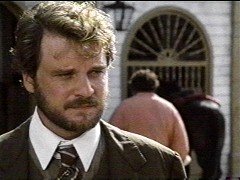 I
agree that Don Jose and Charles are idealists but does that idealism continue
with Charles? He appears more enlightened than others, but to what purpose?
Is he generally concerned about the health of his workers, paying them
well? Or is that the best way for him to extract the silver? I don't think
Charles really cares about democracy. Then again, his beautifully expressive
face really lights up in the first episode as he sees the country again
from the harbor. I
agree that Don Jose and Charles are idealists but does that idealism continue
with Charles? He appears more enlightened than others, but to what purpose?
Is he generally concerned about the health of his workers, paying them
well? Or is that the best way for him to extract the silver? I don't think
Charles really cares about democracy. Then again, his beautifully expressive
face really lights up in the first episode as he sees the country again
from the harbor.
Other motive questions would be Nostromo himself and his reasons for
agreeing to save the silver. But I don't know if I really want to discuss
him myself. Charles is plenty interesting enough.
The lines from the book are very moving and I feel sorry for Emilia,
but I understand her reasons for staying with him. Being single, I forget
how wives (certainly of that time) identify themselves so wholly with their
husbands. Their lives before marriage were insignificant to them as people.
"A terrible success for the last of the Goulds. The last! She had
hoped for a long, long time that perhaps— But no! There were to be no more..."
She is a Gould through and through.
Why is Dr. Monygham so virulently anti-Gould? We can argue it is his
respect and love for Emilia. But is it more?
Sylvia:
(Heide) Why is Dr. Monygham so virulently anti-Gould?
Given his experience with the last revolution, I think he has the idea
that everything will start all over again if the mine is opened. Everyone
will try to get the biggest piece of the cake and use whatever means are
necessary.
I have to admit that I'm not fond of this film. I found it very depressing
and not easy to watch. The plot reminded me of the song "Land of Confusion"
(Phil Collins): "Too many men making too many problems!" I did like the
music and even bought the CD.
Is the average size of horses in South America less than in Europe?
If not, did the producers use these little horses on purpose to show how
ridiculous the various actions are? The horses always look as if they are
trying to run fast but aren't able to do so.
Jana:
It's not my fave. I had good intentions of watching it again, but I
got stuck at the mine scene and have not been able to make myself move
on.
(Sylvia) Is the average size of horses in South America less than
in Europe?
I've always had a hard time not giggling at the sight of those big
macho soldiers on those tiny little horses. I mentioned this to another
Firthophile who knows about such things and, if I remember correctly, she
said that those horses are of the Paso Fino breed. Apparently they're very
special and it's considered a privilege to ride one.
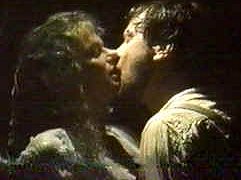 Evelyn: Evelyn:
The Penguin edition of Nostromo has a great introduction by Martin
Seymour-Smith; worth checking out. Puts the novel and characters in perspective.
The whole novel is full of symbolism. Very complex.
(Jana) I got stuck at the mine scene and have not been able to make
myself move on
I was too. Then I discovered that, in effect, he was shagging the mine
and not Emilia. Sometimes it doesn't pay to get literary!
Karen:
(Heide) Why is Dr. Monygham so virulently anti-Gould?
This one is probably a little of both—his love for Emilia and realization
that Charles is ignoring her as well as his clear vision of how power corrupts.
Dr. M sees the reality, but again he is another flawed character because
he does not act. He does not leave Costaguana as one would expect from
a character who has been tortured and who sees little future. Perhaps he
only stays because of Emilia.
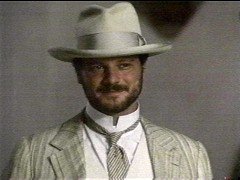 Which
brings me to a discrepancy (I think) between the film and the book. At
the beginning when Charles' father is murdered, we see a picture of Charles
as a little boy. Next, Charles the adult and his wife arrive in Costaguana.
In the book, Charles left Costaguana when he was about 12 to go to school
in England. The letters from his father showed his despair over the politics
of Costaguana and exhorting him to never return to claim his inheritance.
Charles was a third generation Costaguanian; his uncle had been governor
or president. Which
brings me to a discrepancy (I think) between the film and the book. At
the beginning when Charles' father is murdered, we see a picture of Charles
as a little boy. Next, Charles the adult and his wife arrive in Costaguana.
In the book, Charles left Costaguana when he was about 12 to go to school
in England. The letters from his father showed his despair over the politics
of Costaguana and exhorting him to never return to claim his inheritance.
Charles was a third generation Costaguanian; his uncle had been governor
or president.
Anyway, Charles had made up his mind long before his father's death
to make a go of the mine. The stories became like a fairy tale to him.
He studied to be a mining engineer and visited sites all over (as he says
to his father's grave in the movie). He also met Emilia in Italy and their
relationship was one built on understanding rather than any great passion.
He proposes to her right after he hears of his father's death and is planning
to go there to take over (after a slight detour to get financing in the
US from Holyrod). She accepts him and relishes being "the first lady of
European society" in Costaguana, again not terribly passionate from her
side either. She was an orphan and believed in him and his fairy tale.
What other life had she?
So the fact that Charles goes there directly after his father's death,
and not years as would be implied by the photograph, does make for
a different interpretation.
(Jana) I've always had a hard time not giggling at the sight of those
big macho soldiers on those tiny little horses.
They look positively ridiculous. Colin's feet in the stirrups practically
hit the ground.
(Jana) Apparently they're very special and it's considered a privilege
to ride one.
Then you would wonder why *everyone* rode one and then for the long
impossible journey over the mountains to Santa Marta.
(Evelyn) he was shagging the mine and not Emilia. Sometimes it doesn't
pay to get literary!
Dear, it gets worse. Remember the scene when the mine's first output
is produced and Emilia is handed the first chuck of refined ore. That's
supposed to be her giving birth. Do you think Colin and SST were aware
of the symbolism? |
 Karen:
Karen:
 I
think this observation casts light on CF's performance. I tend to see Gould
as a reserved, obsessed man who is basically strong. But many of his actions
are those of a weak and dangerously indecisive man, who in the end is just
as much a failure as his father. This makes Emilia a doubly tragic figure.
By staying loyal to her husband she is condemned to spend her life in a
world she grows to hate. In the end she must also realise that he has compromised
his ideals, and yet she can't stop loving him.
I
think this observation casts light on CF's performance. I tend to see Gould
as a reserved, obsessed man who is basically strong. But many of his actions
are those of a weak and dangerously indecisive man, who in the end is just
as much a failure as his father. This makes Emilia a doubly tragic figure.
By staying loyal to her husband she is condemned to spend her life in a
world she grows to hate. In the end she must also realise that he has compromised
his ideals, and yet she can't stop loving him.
 (Heide)
Does Charles truly love Emilia?
(Heide)
Does Charles truly love Emilia?
 In
what ways do others find Charles weak? My impressions of Charles are not
of a weak or indecisive man at all. To me, he seems very capable, strong,
brave, determined, paternal. He knows just what to do to get the mine open,
who to bribe, who to trust, who to curry favor with. He practically arms
the militia himself and puts himself in grave danger. I do find the idea
of a "papa's boy" interesting though and think that is on target.
In
what ways do others find Charles weak? My impressions of Charles are not
of a weak or indecisive man at all. To me, he seems very capable, strong,
brave, determined, paternal. He knows just what to do to get the mine open,
who to bribe, who to trust, who to curry favor with. He practically arms
the militia himself and puts himself in grave danger. I do find the idea
of a "papa's boy" interesting though and think that is on target.
 There
are things to like. All the characters are flawed (except Emilia) which
makes for interesting motive questions. There are a few golden Colin moments
as well. I use the word "golden" intentionally because I love picking out
the shots where his hair is almost blonde. I also like his rugged appearance
toward the middle of the series, while he struggles to save his silver
when all the hostile sides are converging on Sulaco.
There
are things to like. All the characters are flawed (except Emilia) which
makes for interesting motive questions. There are a few golden Colin moments
as well. I use the word "golden" intentionally because I love picking out
the shots where his hair is almost blonde. I also like his rugged appearance
toward the middle of the series, while he struggles to save his silver
when all the hostile sides are converging on Sulaco.
 Charles
also comes back to avenge his father's death and he thinks he is the man
to do it—a Hercules who will clean the Augean stables. He has an irrational
need to revive the mine and perform a ritualistic act of slaying the dragon
that slew his father. Like the fairy tale he mentions when he and Emilia
are in the mine: "It's like fairy tales when you're young. The spell is
cast over you."
Charles
also comes back to avenge his father's death and he thinks he is the man
to do it—a Hercules who will clean the Augean stables. He has an irrational
need to revive the mine and perform a ritualistic act of slaying the dragon
that slew his father. Like the fairy tale he mentions when he and Emilia
are in the mine: "It's like fairy tales when you're young. The spell is
cast over you."
 Arami:
Arami:
 I
agree that Don Jose and Charles are idealists but does that idealism continue
with Charles? He appears more enlightened than others, but to what purpose?
Is he generally concerned about the health of his workers, paying them
well? Or is that the best way for him to extract the silver? I don't think
Charles really cares about democracy. Then again, his beautifully expressive
face really lights up in the first episode as he sees the country again
from the harbor.
I
agree that Don Jose and Charles are idealists but does that idealism continue
with Charles? He appears more enlightened than others, but to what purpose?
Is he generally concerned about the health of his workers, paying them
well? Or is that the best way for him to extract the silver? I don't think
Charles really cares about democracy. Then again, his beautifully expressive
face really lights up in the first episode as he sees the country again
from the harbor.
 Evelyn:
Evelyn:
 Which
brings me to a discrepancy (I think) between the film and the book. At
the beginning when Charles' father is murdered, we see a picture of Charles
as a little boy. Next, Charles the adult and his wife arrive in Costaguana.
In the book, Charles left Costaguana when he was about 12 to go to school
in England. The letters from his father showed his despair over the politics
of Costaguana and exhorting him to never return to claim his inheritance.
Charles was a third generation Costaguanian; his uncle had been governor
or president.
Which
brings me to a discrepancy (I think) between the film and the book. At
the beginning when Charles' father is murdered, we see a picture of Charles
as a little boy. Next, Charles the adult and his wife arrive in Costaguana.
In the book, Charles left Costaguana when he was about 12 to go to school
in England. The letters from his father showed his despair over the politics
of Costaguana and exhorting him to never return to claim his inheritance.
Charles was a third generation Costaguanian; his uncle had been governor
or president.